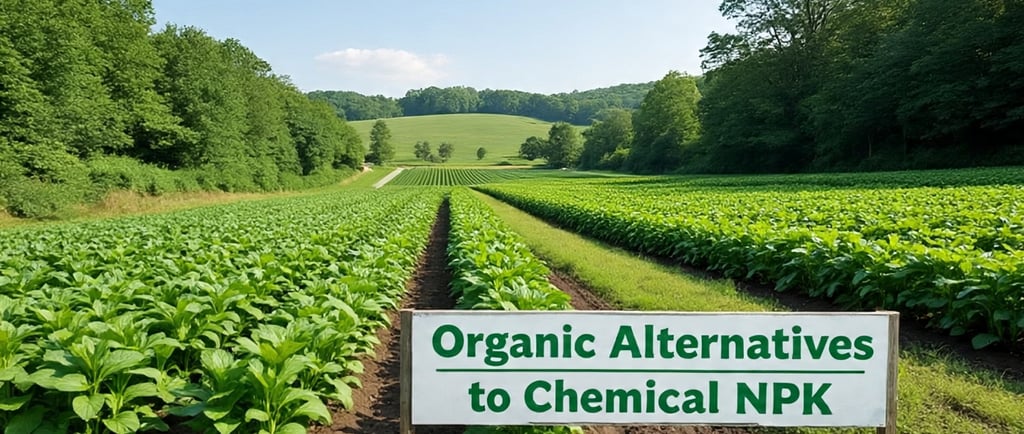

Why Switch to Organic Alternatives?
Farming has evolved significantly over the years, with chemical fertilizers like NPK (Nitrogen, Phosphorus, and Potassium) playing a major role in boosting crop yields. However, the excessive use of these synthetic fertilizers has led to soil degradation, water pollution, and reduced biodiversity. The good news is that organic alternatives to chemical NPK exist, offering a sustainable way to nourish crops while preserving the environment. Let’s explore these organic options, how they compare to chemical fertilizers, and how farmers can make the switch.
Understanding NPK in Chemical Fertilizers
Chemical fertilizers provide essential nutrients in a concentrated form:
Nitrogen (N): Promotes leafy growth and is provided by urea or ammonium nitrate.
Phosphorus §: Supports root development and flowering, found in superphosphate.
Potassium (K): Enhances plant resistance and fruit development, supplied by muriate of potash.
While chemical fertilizers are fast-acting, they come with several drawbacks:
Imbalanced nutrient supply: Overuse leads to soil acidification and nutrient lock-up.
Environmental damage: Runoff pollutes water bodies, harming aquatic life.
Cost: Rising prices of chemical fertilizers add to farmers’ financial burden.
Organic Alternatives to NPK
Organic farming uses natural sources to provide NPK to crops. These alternatives improve soil health, retain moisture, and support microbial activity. Here’s a comparison of chemical NPK and its organic substitutes:
Method of Preparation for Organic NPK Sources
Cow Dung Manure:
Collect fresh cow dung from nearby cattle farms.
Create a heap, mix with dry leaves and kitchen waste, and cover with a tarp.
Let it decompose for 2-3 months, turning the heap every few weeks.
Vermicompost:
Use a compost bin, add kitchen waste, dry leaves, and cow dung.
Introduce earthworms (available at vermicompost units).
Keep the bin moist and harvest compost after 45-60 days.
Bone Meal:
Collect animal bones from slaughterhouses or meat shops.
Grind them into a fine powder using a grinder.
Apply directly to the soil or mix with compost.
Rock Phosphate:
Purchase rock phosphate from agricultural supply stores.
Mix it into the soil during land preparation for slow-release phosphorus.
Wood Ash:
Collect ash from wood-burning stoves or bonfires.
Ensure it is free from chemicals or paint residues.
Sprinkle around plants during flowering stages.
Schedule for Application
Organic fertilizers release nutrients slowly, so timing is crucial:
Pre-sowing: Incorporate cow dung manure or vermicompost into the soil.
Mid-growth stage: Apply additional vermicompost or green manure to boost nitrogen.
Flowering and fruiting: Use wood ash or banana peel compost for potassium.
Where to Source Organic Materials
Local Farms: Cow dung and green manure can be sourced from nearby farms.
Compost Units: Vermicompost and earthworms are available at organic farming centers.
Agricultural Stores: Bone meal and rock phosphate can be purchased from specialized stores.
DIY: Many materials, like kitchen waste, banana peels, and wood ash, can be prepared at home.
Comparison: Chemical vs. Organic NPK
Benefits of Switching to Organic NPK
Improved Soil Health: Organic matter enhances microbial activity, improving soil structure and fertility.
Reduced Costs: Organic materials are often cheaper and locally available.
Environmental Protection: No harmful runoff, preserving water bodies and biodiversity.
Sustainable Farming: Builds resilience against climate change and ensures long-term productivity.
Embrace Organic for a Better Future
Switching to organic alternatives for NPK is not just a choice; it’s a necessity for sustainable farming. By adopting organic practices, farmers can reduce costs, improve soil health, and protect the environment. With proper planning, preparation, and sourcing, organic farming can be a rewarding and eco-friendly journey. Let’s make the shift today for a healthier tomorrow!
Organic Alternatives to Chemical NPK – A Sustainable Farming Approach
Blog post descrFarming has evolved significantly over the years, with chemical fertilizers like NPK (Nitrogen, Phosphorus, and Potassium) playing a major role in boosting crop yields. However, the excessive use of these synthetic fertilizers has led to soil degradation, water pollution, and reduced biodiversity. The good news is that organic alternatives to chemical NPK exist, offering a sustainable way to nourish crops while preserving the environment. Let’s explore these organic options, how they compare to chemical fertilizers, and how farmers can make the switch.iption.
8/3/20252 min read
Organic
Nutrient-rich fruits from our natural farm.
Sustainable
Natural
+919769093810
© 2025. All rights reserved.
